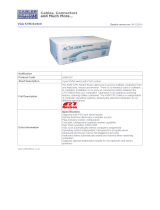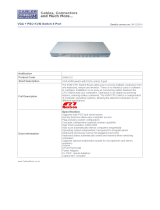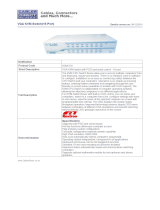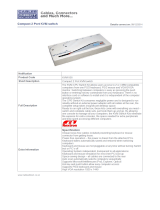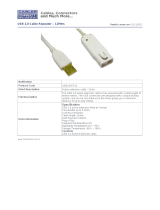Page is loading ...

LINDY CPU Switch
Dual/Quad Pro
Manual English
LINDY Art. Nr. 32361 LINDY CPU Switch Dual Pro 4 Port
LINDY Art. Nr. 32362 LINDY CPU Switch Dual Pro 8 Port
LINDY Art. Nr. 32364 LINDY CPU Switch Quad Pro 16 Port
GB An electronic version of this manual may be downloaded
USA from www.LINDY.com
D A German version of this manual may be downloaded from
www.LINDY.com
F A French version of this manual may be downloaded from
www.LINDY.com

LINDY Dual/Quad PRO Installation and Use Page 1
About this manual
LINDY Dual/Quad PRO- Installation and Use
Second edition (October 2001)
(c) 2001 LINDY Electronics Ltd
Part No. 32361 LINDY CPU Switch Dual Pro 4 Port
Part No. 32362 LINDY CPU Switch Dual Pro 8 Port
Part No. 32364 LINDY CPU Switch Quad Pro 16 Port
Part No. 32391 LINDY Junior Extender Receiver
Part No. 32392 LINDY Pro Extender Receiver
All rights reserved. Whilst every precaution has been taken in the preparation of this
manual, LINDY Electronics Ltd assumes no responsibility for errors or omissions.
Neither is any liability assumed for damages resulting from the use of the
information contained herein. We reserve the right to change the specifications,
functions and circuitry of the product without notice. All trademarks acknowledged.
Safety information
For use in dry, oil free indoor environments only.
Do not attempt to service the LINDY Dual/Quad PRO yourself.
Follow all warnings and instructions marked on the LINDY Dual/Quad PRO, its
power adapter and its accessories.
Warning - live parts contained within power adapter.
No user serviceable parts within power adapter - do not dismantle.
Plug the power adapter into a socket outlet close to the LINDY Dual/Quad PRO.
Replace the power adapter with a manufacturer approved type only.
Do not use power adapter if power adapter case becomes damaged, cracked or
broken or if you suspect that it is not operating properly.
If you use a power extension cord with the LINDY Dual/Quad PRO, make sure
the total ampere rating of the devices plugged into the extension cord does not
exceed the cord’s ampere rating. Also, make sure that the total ampere rating of
all the devices plugged into the wall outlet does not exceed the wall outlet’s
ampere rating.

LINDY Dual/Quad PRO Installation and Use Page 2
Warranty
LINDY Electronics Ltd warrants that this product shall be free from defects in
workmanship and materials for a period of 1 year from the date of original purchase.
If the product should fail to operate correctly in normal use during the warranty
period, LINDY will replace or repair it free of charge. No liability can be accepted for
damage due to misuse or circumstances outside LINDY’s control. Also LINDY will
not be responsible for any loss, damage or injury arising directly or indirectly from
the use of this product. LINDY’s total liability under the terms of this warranty shall in
all circumstances be limited to the replacement value of this product. If any difficulty
is experienced in the installation or use of this product that you are unable to
resolve, please contact your supplier.
Radio Frequency Energy
Shielded cables must be used with this equipment to maintain compliance with radio
frequency energy emission regulations and ensure a suitably high level of immunity
to electromagnetic disturbances.
European EMC directive 89/336/EEC
This equipment has been tested and found to
comply with the limits for a class A computing
device in accordance with the specifications in
the European standard EN55022. These limits
are designed to provide reasonable protection
against harmful interference. This equipment
generates, uses and can radiate radio frequency
energy and if not installed and used in
accordance with the instructions may cause
harmful interference to radio or television
reception. However, there is no guarantee that
harmful interference will not occur in a particular
installation. If this equipment does cause
interference to radio or television reception,
which can be determined by turning the
equipment on and off, the user is encouraged to
correct the interference with one or more of the
following measures: (a) Reorient or relocate the
receiving antenna. (b) Increase the separation
between the equipment and the receiver. (c)
Connect the equipment to an outlet on a circuit
different from that to which the receiver is
connected. (d) Consult the supplier or an
experienced radio / TV technician for help.
FCC Compliance Statement (United States)
This equipment generates, uses and can radiate
radio frequency energy and if not installed and
used properly, that is, in strict accordance with
the manufacturer’s instructions, may cause
interference to radio communication. It has been
tested and found to comply with the limits for a
class A computing device in accordance with
the specifications in Subpart J of part 15 of FCC
rules, which are designed to provide reasonable
protection against such interference when the
equipment is operated in a commercial
environment. Operation of this equipment in a
residential area may cause interference, in
which case the user at his own expense will be
required to take whatever measures may be
necessary to correct the interference. Changes
or modifications not expressly approved by the
manufacturer could void the user’s authority to
operate the equipment.
Canadian Department of Communications
RFI statement
This equipment does not exceed the class A
limits for radio noise emissions from digital
apparatus set out in the radio interference
regulations of the Canadian Department of
Communications.
Le présent appareil numérique n’émet pas de
bruits radioélectriques dépassant les limites
applicables aux appareils numériques de la
classe A prescrites dans le règlement sur le
brouillage radioélectriques publié par le
ministère des Communications du Canada.

LINDY Dual/Quad PRO Installation and Use Page 3
Contents
1. Introduction.....................................................................................5
1.1 Key features and benefits.......................................................................6
1.2 LINDY Dual/Quad PRO package contents.............................................8
1.3 LINDY Junior Extender receiver package contents................................8
1.4 LINDY Pro Extender receiver package contents ....................................8
1.5 Product information ................................................................................9
2. Installation.......................................................................................13
2.1 What you will need ................................................................................13
2.2 Mounting the LINDY Dual/Quad PRO ...................................................15
2.3 Connecting your devices .......................................................................15
2.4 Configuring your PCs ............................................................................16
2.5 Structuring your LINDY Dual/Quad PRO installation .............................17
2.6 Maximising the video quality ..................................................................22
2.7 Other useful installation information ......................................................23
2.8 Re-enabling a disconnected PS/2 mouse ..............................................23
2.9 Hot plugging the LINDY Dual/Quad PRO into running systems and re-
enabling disconnected PS/2 CPU mouse connections ................................24
3. Configuring the LINDY Dual/Quad PRO ......................................26
3.1 Configuration summary...........................................................................26
3.2 Enabling password security....................................................................27
3.3 Setting an ADMIN password...................................................................28
3.4 Creating and editing user accounts .......................................................28
3.5 Creating and editing computer names....................................................29
3.6 Setting the SETUP OPTIONS and GLOBAL PREFERENCES...............33

LINDY Dual/Quad PRO Installation and Use Page 4
4. Using the LINDY Dual/Quad PRO..................................................39
4.1 Rear panel special function switches .....................................................39
4.2 Power supply connections and indicators .............................................39
4.3 USER display and key switch.................................................................39
4.4 COMPUTER display and key switch.......................................................40
4.5 Activity indicators ...................................................................................41
4.6 Selecting a computer using the front panel controls...............................41
4.7 Logging on to the LINDY Dual/Quad PRO .............................................42
4.8 Keyboard hotkeys ..................................................................................43
4.9 Selecting computers using the mouse....................................................45
4.10 Selecting computers using the on-screen menu...................................46
4.11 The reminder banner ...........................................................................50
4.12 Setting the USER PREFERENCES......................................................51
4.13 Using the FUNCTIONS menu...............................................................52
4.14 Querying the routing status ..................................................................53
4.15 Using the dual access ports (1 and 3) .................................................54
4.16 Cascading LINDY Dual/Quad PRO’s ...................................................54
4.17 Resetting user port keyboards and mice .............................................55
4.18 Using the LINDY extender ...................................................................56
4.19 What to do if you forget your ADMIN password ...................................56
4.20 Saving and restoring the menu configuration to and from an Excel
compatible spreadsheet........................................................................57
5. Upgrading the LINDY Dual/Quad PRO's firmware ......................60
Appendices
A - Cable and connector specifications.................................................................65
B - Problem solving...............................................................................................68

LINDY Dual/Quad PRO Installation and Use Page 5
1. Introduction
Thank you for purchasing the LINDY Dual/Quad PRO. Your LINDY Dual/Quad PRO
is a very high performance Keyboard, Video monitor and Mouse (KVM) sharing
device which supports a wide range of PC hardware and software platforms. The
LINDY Dual/Quad PRO supports multiple users and enables each user to
independently access the connected computers.
An On-Screen-Display (OSD) menu system is provided for easy computer selection
and control. This enables users to select computers by name or description without
having to remember the port that the computer is physically connected to. The OSD
menu system also provides a security structure that enables the system
administrator to allocate access rights to each user on a login basis.
LINDY Dual/Quad PRO products are fitted with one (2) or two (4) dual access user
ports. These dual access ports have both traditional KVM connectors for local
keyboard, monitor and mouse connections and an RJ45 link for connection to a
remote LINDY extender unit. This gives the user the ability to connect to the LINDY
Dual/Quad PRO from up to 200 metres away using common twisted pair network
cable whilst still having the ability to access the LINDY Dual/Quad PRO using a
local KVM console.
We trust that you will be delighted with the function of your new LINDY Dual/Quad
PRO. We are always interested to hear any suggestions that you may have for
additional features or functionality (email to: [email protected]). Product
enhancement upgrades are provided free of charge during the warranty period and
may be obtained by request from www.lindy.co.uk. Some of the main features and
benefits that are offered by your LINDY Dual/Quad PRO are listed in section 1.1
LINDY explains:
What does KVM stand for?
Throughout this manual the abbreviation KVM is used to refer to the combination of
a Keyboard, Video monitor and Mouse that is used to access a computer. A KVM
console usually consists of a keyboard, monitor and mouse although sometimes
only a keyboard and monitor may be used. Devices such as the LINDY Dual/Quad
PRO are generally known as KVM sharers or KVM switches.

LINDY Dual/Quad PRO Installation and Use Page 6
1.1 Key features and benefits
Enables many computers to be independently controlled by multiple users.
On-screen menu allows computers to be selected by name or description.
Configurable security enables administrator to assign access rights to users.
Dual-access port(s) with built-in 200 metre LINDY extender connections enable
the LINDY Dual/Quad PRO to be controlled from local and remote KVM consoles.
Two independent users are supported on 2 models via one local KVM port and
one dual-access local / remote KVM port.
Four independent users are supported on 4 models via two local KVM ports and
two dual-access local / remote KVM ports.
Advanced On-Screen Display (OSD) for easy control and configuration.
Channel switching by On-Screen Display, front panel key, keyboard hotkey, or 3
button mouse.
Supports high bandwidth monitors at resolutions up to 1920 x 1440.
Fully flash upgradable via the serial port (upgrade cable included).
Supports a very wide range of software including Windows 3.X, WFWG, 95, 98,
2000, NT, ME, XP, DOS, Unix, Linux, NetWare, OS/2, BSD etc.
Video channels support Display Data Channel (DDC/DDC1/DDC2) signalling.
Supports desktop and laptop PCs, RS6000s, DEC Alphas, and Silicon Graphics
computers.
Dual power supply capability and front panel "healthy voltage" indicators provide
power redundancy, high reliability and peace of mind.
Support for up to 16 user access profiles and 512 named computers.
The colours and position of the OSD menu may be changed by each user.
Optional small-sized reminder banner permanently confirms the selected
computer.
Supports three computer control modes - Exclusive, Shared and Video Only.

LINDY Dual/Quad PRO Installation and Use Page 7
OSD routing status window shows the computers that are currently being
controlled by the KVM consoles.
Compact 1U (2) and 2U (4) cases may be neatly fitted under a monitor or fixed
into a 19 inch rack using the supplied rack-mount kit.
SmartBoot ensures reliable simultaneous bootup of all computers.
User and computer name information may be uploaded to a PC and saved in an
Excel compatible file. This file may be edited in Excel and downloaded back to the
CPU Switch.
Mixed AT/PS2 keyboards and PS2/RS232 mice supported as standard.
Can be cascaded to a depth of four levels to provide a video switching network.
Automatically restores keyboard and mouse states when channel changed.
Supports keyboard modes 1,2 and 3 and mouse prompt and stream modes for
maximum compatibility.
Includes screen saver, auto-scan, variable hotkey and name search options.
Supports moving or blank screen savers and auto-logout on screen save option.
Wheel mouse may be used to launch and operate the OSD menus.
User may select English, French or German OSD menus.
Positive confirmation of selected ports on local and cascaded LINDY Dual/Quad
PRO’s achieved by full acknowledgement signalling across all cascaded units.
Supports Microsoft IntelliMouse, IntelliMouse Explorer and other common wheel
mice.
Supports keyboards with extra Internet and audio function keys because the
keyboard data is kept in its native format.
Mouse restoration functions to enable ‘hot plugging’ of certain systems.
Front panel controls may be locked for secure operation.
Individual power-down reset of user ports enables hot-swapping of KVM
consoles.
Standard colour-coded cable connections make installation easy and
inexpensive.

LINDY Dual/Quad PRO Installation and Use Page 8
1.2 LINDY Dual/Quad PRO package contents
LINDY Dual/Quad PRO.
Power supply suitable for your country.
6 x stick on self-adhesive rubber feet.
2 x mounting brackets for fixing the unit into a 19 inch rack.
4 x screws for fixing mounting brackets to LINDY Dual/Quad PRO
(6 screws supplied with Quad PRO models)
This installation guide.
A serial cable for flash upgrades and upload / download functions.
1.3 LINDY JUNIOR EXTENDER receiver package contents
(part code 32391)
LINDY Junior Extender receiver.
Power supply suitable for your country.
Installation and Use guide
1.4 LINDY PRO EXTENDER receiver package contents
(part code 32392)
LINDY Pro Extender receiver.
Power supply suitable for your country.
Installation and Use guide.

LINDY Dual/Quad PRO Installation and Use Page 9
1.5 Product information
Fig. 1 - LINDY Dual/Quad PRO models viewed from the front

LINDY Dual/Quad PRO Installation and Use Page 10
Fig. 2 - LINDY Dual/Quad PRO 8 and 16 port models viewed from the rear
(4 and 12 port models are similar but with less computer ports)

LINDY Dual/Quad PRO Installation and Use Page 11
Fig. 3 - LINDY Junior Extender (top) and LINDY Pro Extender (below)
receiver units

LINDY Dual/Quad PRO Installation and Use Page 12
Fig. 4 - Mounting the LINDY Extender into its 19 inch rack mounting bracket

LINDY Dual/Quad PRO Installation and Use Page 13
2. Installation
LINDY explains:
Flexible configuration
The LINDY Dual/Quad PRO has many ports for connection to computers,
keyboards, mice, monitors and LINDY Link extenders. There are no restrictions
placed upon which ports are connected to devices and you can leave any of the
ports disconnected if you wish. You do not need to connect a keyboard, monitor and
mouse to each user port if you do not wish to use all of these. You may perhaps
decide to connect just a keyboard and monitor or you may decide to connect to just
one user port. All of these configurations are supported. What's more, your devices
do not all need to be of the same type. You may wish to use a large high-resolution
monitor with an extended keyboard and a wheel mouse on one user port and a
smaller monitor with a basic mouse and keyboard on another. The LINDY
Dual/Quad PRO intelligently handles these mixtures of devices.
2.1 What you will need
For the computer connections you will need:
Cables to connect the LINDY Dual/Quad PRO to each of your computer
keyboard, video and mouse ports. Cable specifications are given in appendix A.
LINDY 3-in-1 keyboard / video / mouse combination cables are particularly
recommended for neatness, convenience and video quality. (You do not need to
connect a mouse cable if you are not using the mouse).
A suitable mouse driver for your PCs. Supported types are:
- PS/2 or RS232 two button mouse driver (any manufacturer).
- Microsoft mouse driver (including IntelliMouse).
- Logitech mouse driver (including two button, three button and wheel mouse).
- General mouse drivers that are supplied with the operating system.
For the local user port connections you will need:
A monitor with a standard VGA-style 15-pin analogue video connector that will
work when connected directly to each of your PCs. LINDY Dual/Quad PRO supports
low and high resolution monitors.

LINDY Dual/Quad PRO Installation and Use Page 14
A PS/2 or AT style keyboard. If you are using an AT keyboard with a 5-pin
connector you may connect this to the LINDY Dual/Quad PRO using a standard AT
to PS/2 keyboard adapter. LINDY Dual/Quad PRO supports standard keyboards
and keyboards with extra media control and Internet navigation keys.
All LINDY PS/2 Mice and PS/2 style two or three button Microsoft
or Logitech
compatible mouse or a Microsoft IntelliMouse compatible mouse. If you wish to use
the mouse to switch the LINDY Dual/Quad PRO's channel then you will need a three
button mouse or an IntelliMouse.
(The LINDY Dual/Quad PRO supports ‘Internet / scroll mice’ that are compatible with
the Microsoft IntelliMouse. These are fitted with a wheel or other scroll control and
sometimes have additional buttons. Examples are: Microsoft IntelliMouse, Logitech
Pilot Mouse+, Logitech MouseMan+, Genius NetMouse and Genius NetMouse Pro.)
For the integrated LINDY Extender ports you will need:
An LINDY Junior Extender or LINDY Pro Extender receiver. These receivers are
not provided with the LINDY Dual/Quad PRO and may be purchased separately.
The LINDY transmitter unit is built in to the LINDY Dual/Quad PRO.
A suitable twisted pair cable that runs from the LINDY Dual/Quad PRO to the
location where you wish to locate your remote keyboard, video monitor and mouse.
The LINDY Dual/Quad PRO built-in extender uses the same type of cable that is
commonly used for Ethernet networks. This type of wiring is often installed into
buildings and terminated at wiring sockets in various locations. If you have this type
of wiring then you will just need to run a standard network-style patch cable between
the wiring socket and the LINDY Dual/Quad PRO at one end and between the wiring
socket and the LINDY extender at the other end.
IMPORTANT WARNING
Do not connect the CPU Switch's extender ports to an Ethernet hub or other
digital network device. The signals carried on the twisted pair cable between
the CPU Switch and the Lindy Extender are ANALOGUE. Plugging the CPU
Switch or Lindy Extender into a digital network device such as a hub may
damage you devices

LINDY Dual/Quad PRO Installation and Use Page 15
Use of PS/2 and RS232 style mice with the LINDY Dual/Quad PRO - All of the
mouse connections from LINDY Dual/Quad PRO to PCs support either a PS/2 or an
RS232 mouse. LINDY Dual/Quad PRO automatically converts from the PS/2 mouse
commands to RS232 serial mouse commands. Serial mice types are selected by
using an adapter as described in Appendix A. The LINDY Dual/Quad PRO will
operate without a mouse connected if you do not wish to use one.
2.2 Mounting the LINDY Dual/Quad PRO
The LINDY Dual/Quad PRO has been designed to be used either on a desktop or
mounted in a 19 inch rack. If the LINDY Dual/Quad PRO is to be used on a desktop
then you will need to stick the supplied self-adhesive rubber feet to the underside of
the LINDY Dual/Quad PRO. If the LINDY Dual/Quad PRO is to be mounted in a 19
inch rack then you will need to fit the rack mounting brackets to the side of the
LINDY Dual/Quad PRO. Do this using the brackets and screws provided.
2.3 Connecting your devices
Ensure that the power is disconnected from the LINDY Dual/Quad PRO and all
devices which are to be attached. Connect any local keyboards, monitors and mice
to the user port connectors at the rear of the LINDY Dual/Quad PRO (see figure 2).
The user ports are coloured white and the individual connectors are colour coded
for your convenience. If you are connecting several KVM (Keyboard, Video monitor,
Mouse) sets then you do not need to use the same brands or mix of devices on each
user port.
User ports 1 and 3 are dual access ports and may have both a local KVM
(connected directly) and a remote KVM (connected via and LINDY extender)
attached at the same time. The local and remote KVM’s share the port on a timeout
basis but only one KVM may be using the port at any one time. If you are not using
all the local KVM connections it is preferable to connect the KVM’s to ports that are
not shared with the LINDY so that these KVM’s have fully independent access to the
LINDY Dual/Quad PRO.
Next connect each computer system unit in turn with the keyboard cable, mouse
cable and video cable. LINDY 3-in-1 keyboard/video/mouse cables are
recommended for maximum convenience and video quality. Remember that the
video quality is maximised if the cables are kept as short as possible. Where

LINDY Dual/Quad PRO Installation and Use Page 16
possible, 2 metre cables are recommended as these will give very high video
quality. Any unused computer connections can be left unconnected. To connect
computers with serial mouse connections and AT style keyboard connections use
the adapters specified in appendix A. If you have an existing 6-pin mini-DIN to 9-pin
serial adapter that came with a mouse it may not be suitable for use with the LINDY
Dual/Quad PRO as the are several different standard wiring configurations for these
adapters.
The LINDY Dual/Quad PRO is now ready for connection to the mains using the
mains power adapter supplied. It is important to apply power to the LINDY
Dual/Quad PRO first, then power on the monitor and each of the computers in turn.
Failure to switch the LINDY Dual/Quad PRO and computers on in the correct order
can lead to the mouse and/or keyboard not being recognised by the computers
when they are switched on.
You may attach the power adapter to either power inlet A or power inlet B (see
figure 2). These ports are both the same and are provided to enable you to connect
a redundant (spare) power supply (see section 4.2 for more details). Connect your
power adapter to either of the power inlet ports to power on the LINDY Dual/Quad
PRO. There is no ON/OFF switch and the LINDY Dual/Quad PRO will start to
operate as soon as the power is applied.
2.4 Configuring your PCs
Configure your PC in the same way that you would if your keyboard, mouse and
monitor were all connected directly to your PC, but bearing in mind the following
point:
LINDY Dual/Quad PRO emulates Microsoft compatible serial, IntelliMouse and

LINDY Dual/Quad PRO Installation and Use Page 17
PS/2 mice, so ensure that your PC software is configured for a Microsoft mouse of
the correct type. Refer to the list of supported drivers in section 2.1.
2.5 Structuring your LINDY Dual/Quad PRO installation
A single LINDY Dual/Quad PRO 16 may be used to manage and control up to 16
computers (see figure 5). For larger numbers of computers, Dual/Quad PRO units
may be cascaded in a tree structure to form a video switching network (see figure 6).
The LINDY Dual/Quad PRO unit at the top of this tree structure is normally used to
control all the cascaded LINDY Dual/Quad PRO’s although other configurations are
possible.
The LINDY Dual/Quad PRO is fitted with an intelligent communication system that
enables it to detect and communicate with other LINDY Dual/Quad PRO’s so that it
is able to positively verify that all the cascaded LINDY Dual/Quad PRO’s have
correctly responded to a switching request from the user. The LINDY Dual/Quad
PRO’s communicate with each other via the keyboard cables.
LINDY Dual/Quad PRO may be cascaded in a very flexible manner. Either 1, 2, 3 or
4 links may be made between cascaded LINDY Dual/Quad PRO’s. The number of
independent users supported by the system is determined by the number of
cascade links that have been installed. If only two cascade links are made then only
two users have simultaneous access to ports on the cascaded LINDY Dual/Quad
PRO’s. The LINDY Dual/Quad PRO intelligently manages the cascade links and
allocates them on a first come first served basis rather like a telephone network.
LINDY Dual/Quad PRO may also be cascaded to single user LINDY Dual/Quad
PRO products with the restriction that the LINDY Dual/Quad PRO units must be on
the last layer of the tree and that no further units are cascaded off these.
When cascading LINDY Dual/Quad PRO keep in mind the following rules
The maximum number of layers in a LINDY Dual/Quad PRO cascade is four.
You may cascade 4 units with 1, 2, 3 or 4 KVM links and 2 units with 1 or 2 KVM
links. The number of KVM links that you install defines the number of simultaneous
uses that are supported.
Keep all cascade cables as short as possible. The video quality is maximised by
using the shortest possible total cable run from computer to KVM.

LINDY Dual/Quad PRO Installation and Use Page 18
If you are making multiple cascade links between LINDY Dual/Quad PRO then
ensure that the cables are approximately the same length.
LINDY Dual/Quad PRO devices may be cascaded to cascades but the Pro units
must always be on the lowest level of the cascade (in other words you must not
cascade an device off a Pro device)
LINDY Dual/Quad PRO 4, 8, 12 and 16 models may be cascaded together.
You must choose groups of cascade ports from the following table. When you
cascade using a group of ports the system will allocate the first available free port in
that group (see section 4.10 and 4.16 for more details)
The following diagrams show some typical LINDY Dual/Quad PRO installations.

LINDY Dual/Quad PRO Installation and Use Page 19
Fig. 5 - A typical installation using a single LINDY Dual/Quad PRO 8 Port
/
